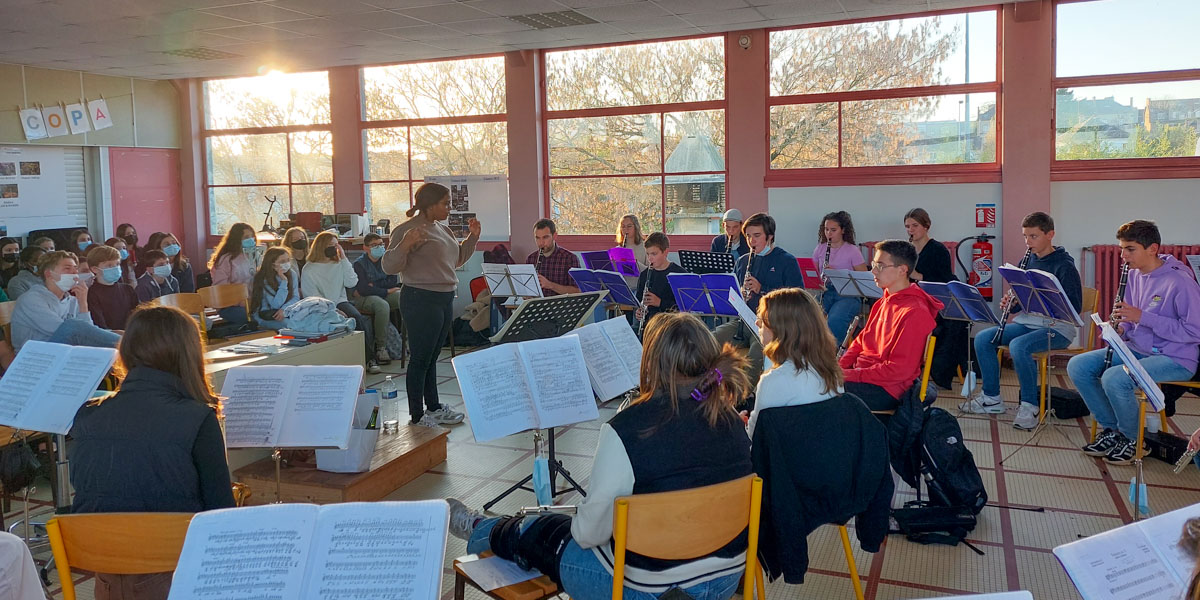
Topics
News & Resources
News & Resources
Group Feedback Sessions: Finding the Right Words
 At the General Conference of Sistema Europe and Superar in Vienna, I gave a lecture and workshop on various ways of giving feedback to groups that promotes individual autonomy. Teaching for social change almost always means we teach in large groups. Taking time for individual expression can be tricky; still, there are many proven ways to do this.
At the General Conference of Sistema Europe and Superar in Vienna, I gave a lecture and workshop on various ways of giving feedback to groups that promotes individual autonomy. Teaching for social change almost always means we teach in large groups. Taking time for individual expression can be tricky; still, there are many proven ways to do this.
One of the common suggestions among pedagogues is giving instructions with a time limit by using words like “for now.” This may not seem like much, but a simple phrase can open up space for positive change. It sets a concrete goal, but also shows that ideas change. It shows that both music and teaching are fluid. It is an easy way to get group cohesiveness and gentle authority without being heavy-handed. These are powerful words to incorporate into teaching, two simple words that open the door to experimentation and life-long learning. The phrase promotes both cooperation and flexibility. It is more of an agreement and less of a command.
As often happens when I run a workshop, I came out with more insights than I went in with. There were many languages present where the phrase “for now” isn’t as common or natural as it is in English. We had a long talk about the feeling behind the words, and the importance of giving instructions with a time frame, such as “for the next two weeks,” “try it this time,” or “see this through until June.” You’ve gotten a commitment from them, and when the time frame is up, you can ask them how it feels. You’ve also created space for them to be self-reflective about their own progress. This eliminates the idea that instructions are meant for forever.
We discussed the no-questions-asked approaches regarding interpretation and technique, the ‘all eyes on me’ command, and how difficult it is to get students in involved in interpretation under those conditions. With a “for now” approach, you can open up discussions and student-led interpretations. Let them suggest imagery. Let them tell stories. They can try it for now. Later they can try something else. Check in and ask how their imagery is working for them. Ask them if they have new ideas or need a change.
During the workshop, we hit on a difficult topic for all of us: having our authority challenged. We had all heard a student say, “But my other teacher said…” Of course this makes us feel disrespected. I have heard teachers go out of their way to convince kids that their former teacher was dead wrong. I have also watched the life fade out of a student’s eyes, upon hearing this. It’s a betrayal students don’t need.
Building trust between children and adults in at-risk communities is necessary work. When children have been betrayed by the system, building a wider support network is part of the work we are called to do; without it, we will not likely see the social change we are wishing for. It is important in this situation to remember that often, the bond with a music teacher is an extraordinarily strong one. Respect those bonds and keep them intact, regardless of differences of opinion. Teachers do not do their students a service when they criticize or gossip about another teacher. Students feel betrayed, like they were lied to or that they wasted their time. They don’t know whom to trust. Remember that every relationship is more important than any technique.
Use language that eliminates the need for the students to choose sides. Find some truth in what the other teacher did. You might have to stretch yourself, but using phrases like “We’re going to try something different for now,” or ‘’I’m using a different approach” can encourage flexibility without dividing loyalties. Use any phrase you can to show that neither teaching nor interpretation is cemented in stone. Try hybrid approaches. Open the door to experimentation and questions.
These sentiments are helpful in building up our own teaching community as well. It is a way for us to respect the autonomy and varied teaching approaches of one another. We are, after all, a widely varied community, but we share a commitment to a common vision. Kids need to see us support one another and watch us deal with differences respectfully.
I think we should all at least try it and see how it works. For now.
Author: Jennifer Borkowski, Educational development consultant for organizations looking to innovate their music teaching practice
Date Published: 16 March 2019
Related Content
Events/Performances, Gather Together, News and Resources, North America, the world ensemble, Uncategorized

El Sistema USA Invites Sistema Europe to Participate in Upcoming Virtual National Symposium and Seminario
longy-admin



